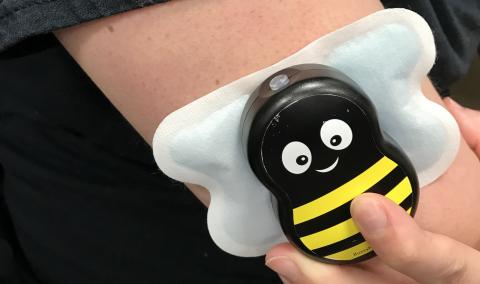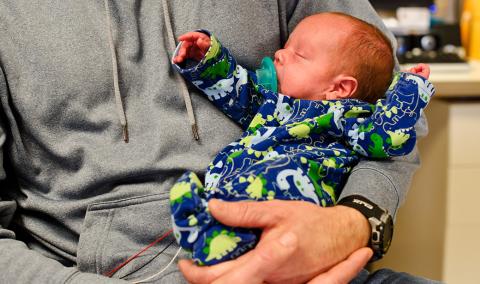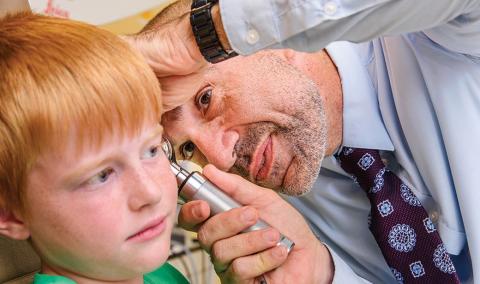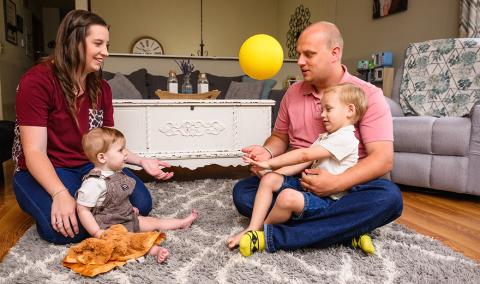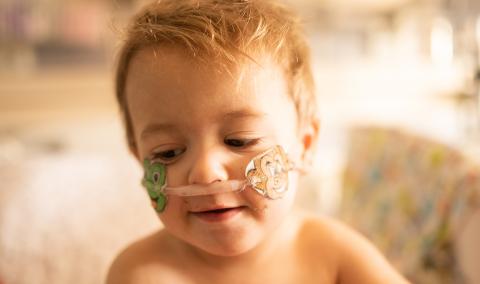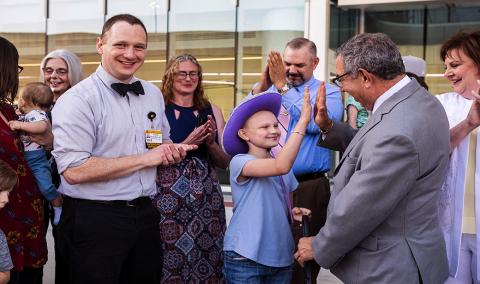Seizures can be a confusing or even scary experience. Our team of pediatric neurologists can answer your questions, figure out what's wrong, and help get you and your child back to feeling safe, happy and living a normal life.
Epilepsy is a neurological condition that causes nerve cells in the brain to misfire, causing short errors in communication and leading to seizures. It is the most common neurological disorder in children and can be diagnosed and treated without long-term negative effects in most cases.
After your child has experienced a seizure, you may feel lost or scared. Our pediatric neurologists are here to help your family find solutions, and work with each child individually to develop a treatment plan.
The National Association of Epilepsy Centers has recognized our team with its highest designation, Level 4, which means we offer the most extensive diagnostic monitoring and medical treatment, including evaluating for and performing epilepsy surgery.
What causes epilepsy
Epilepsy is generally defined as two seizures, without a known medical cause, at least 24 hours apart. Epilepsy can develop in anyone at any time and is the most common neurological disorder in children. It can develop with no clear cause, or it can be linked to factors including genetics, head trauma, brain abnormalities caused by other conditions such as a stroke or tumors, viral or parasitic infection, prenatal injury or developmental delays such as autism.
What causes seizures
A seizure is the sudden disturbance of normal electrical signals sent between nerve cells in the brain, which can result in muscle spasms, behavioral or sensory changes, or loss of consciousness.
A seizure can be caused by fever (febrile seizure), stroke, head injury, or other factors, but in many cases the cause is not clear. Not all seizures are caused by epilepsy, which is why our experts are here to help.
How we diagnose epilepsy
Our pediatric neurologists will meet with you and your child to discuss past medical history, including medication and family history of epilepsy or seizures.
Testing can give us a clearer picture of your child's brain and central nervous system. We make sure your child is comfortable during our evaluations, which may include:
- A neurological exam to evaluate motor and sensory function, behavior and mental function.
- An electroencephalogram (EEG), which uses small electrodes connected to the scalp to painlessly record the electrical signals being sent in your child's brain. This test can be done at home via an ambulatory EEG, in an outpatient setting or during an overnight stay in the hospital and reveals abnormal brain waves that are present even without a seizure.
- A magnetic resonance imaging (MRI) scan, an outpatient test that uses magnets and radio waves to create diagnostic images. Our team has access to a 7-Tesla MRI machine, the most powerful in the state, which provides incredibly detailed images of the brain and body.
- A computerized tomography (CT) scan, an outpatient procedure that stitches x-ray images taken at different angles together to build a cross-section of the brain and reveal structural problems.
- Positron emission tomography (PET), an outpatient test that uses a tiny amount of radiation to measure chemical metabolism in brain cells, as well as detecting problems in brain function or structure.
- Continuous video EEG, part of our epilepsy monitoring unit that allows our experts to study your child's brain waves and seizure activity in real time, on site. Inpatient monitoring lasts 24 hours, or up to seven days, and can be done together with neuropsychological testing, or when adjusting medication dosage or recommending new medication.
Treating pediatric epilepsy
Because each child is different, our team of pediatric neurologists will discuss your child's options and develop a treatment plan based on their history.
Medication
Medication is usually the first treatment option for epilepsy in children. Anti-seizure or anti-epileptic medications work for many children and their families, and more than 20 are available. Our specialists will use information such as age, seizure frequency and type when prescribing a medication. Follow-up visits may be necessary to ensure the dosage is properly controlling your child's seizures.
It is common for children who have epilepsy that can be managed by medication to eventually stop taking medication and live epilepsy-free.
Ketogenic diet
In some cases where your child's epilepsy is not responding to single- or multiple-medication treatment, changing to a ketogenic diet, or a high-fat, low-carbohydrate diet, can be an effective treatment. If this is an option, our team will coordinate with dietitians and other pediatric specialists as necessary to make sure this diet is effective and to educate your family on how to apply and stick to it.
Implant treatments
Two other avenues for treatment use pacemaker-like devices to help your brain manage and control brain signals. A vagus nerve stimulator connects a small battery-operated device programmed by our specialists to the vagus nerve in your child's neck through wires, and alone or in combination with medication can reduce the frequency and severity of seizures. Deep nerve stimulation uses electrodes implanted in a specific part of the brain to deliver regularly timed electrical signals to reduce seizures.
Surgery
Some forms of epilepsy cause frequent seizures that cannot be controlled by medication or diet. In these cases, your child's neurologist may recommend surgery as a treatment option and will work closely with our surgery team which includes a dedicated neurosurgeon. To determine if surgery is a viable treatment option, they may use:
- A Wada test, an outpatient surgical evaluation that uses anesthesia to tell which areas of the brain are key for language, memory and other important functions.
- Single-photon emission computed tomography (SPECT), an inpatient CT scan that uses a tiny amount of radiation to measure blood flow in the brain and can reveal the site of a seizure when it begins.
Clinical trials for epilepsy treatment
For some children, conventional epilepsy treatments do not help relieve seizures. As an academic medical center, our pediatric neurologists have access to, and help research, the latest improvements in epilepsy care, making treatment options safer and more effective.
Our specialists participate in multiple clinical trials to look for new treatment options for medication-resistant forms of epilepsy and can offer novel drug therapies that are being investigated.
If our specialists think your child might be a candidate for a clinical trial, they may talk to your family about eligibility and enrollment. You can also ask your doctor about clinical trials currently enrolling.
Related Conditions & Treatments
- Adolescent Medicine
- Chest Wall Deformities
- Down Syndrome
- Emergency Care for Kids
- Gastrostomy and Feeding Access Program
- Hyperbaric Oxygen Therapy
- Juvenile Diabetes
- Neonatology
- Pediatric Anesthesiology
- Pediatric Cancer
- Pectus Carinatum
- Pectus Excavatum
- Pediatric Cardiology
- Pediatric Dermatology
- Pediatric Development and Behavior
- Pediatric ENT (Ear, Nose and Throat)
- Pediatric Epilepsy
- Pediatric Eye Care
- Pediatric Gastroenterology
- Pediatric Infectious Diseases
- Pediatric Inpatient Rehabilitation
- Pediatric Nephrology
- Pediatric Neurology
- Pediatric Neurosurgery
- Pediatric Orthopaedics
- Pediatric Plastic Surgery
- Pediatric Primary Care
- Pediatric Psychiatry
- Pediatric Pulmonary Medicine
- Pediatric Sleep Medicine
- Pediatric Surgery
- Pediatric Surgical Services
- Pediatric Urology
- Pediatric Vascular Anomalies
- Pediatric Weight Management
- Sickle Cell Disease
- Aerodigestive Program







